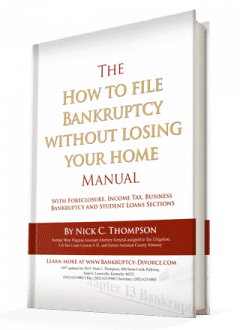A Bankruptcy panel trustee examines a bankruptcy petition for accuracy and completeness of the petition. The most common types of bankruptcy fraud are the concealment of income and assets and making fraudulent transfers within two years before filing for bankruptcy. But other items can even lead to criminal investigation and prosecution.
Avoiding Bankruptcy Fraud • The Need for Accuracy and Completeness
Familiar Sources of Minor Bankruptcy Fraud Issues
The common causes for what is considered bankruptcy fraud include:
- the concealment of assets or failure to list all their assets,
- an undervalued asset (your inheritance or lawsuit for personal injuries is an asset)
- understating income
- overstates debts and expenses
- An effort to transfer money or assets within two years before filing for less than the fair market value. This includes gifts.
Common Bankruptcy Fraud Scenarios
Bankruptcy fraud also commonly arises in a case when a debtor fails to understand how to file for bankruptcy properly. Two of the common items which will cause a motion to dismiss a case or not allow discharge of debt include:
- a bankruptcy that transfers property for less than what it is worth
- that charges large amounts just before a bankruptcy filing
Fraudulent Charges Just Before Bankruptcy
Two common types of bankruptcy fraud arise in either Chapter 7 or Chapter 13 Bankruptcy. The first type of bankruptcy fraud is making charges on an account within 90 days of filing bankruptcy.
Charges are presumed fraudulent if you charge over $750 within 90 days of bankruptcy. It looks like you made the charges with no intention to repay. But there are over 20 other factors the court looks at.
Creditors and Adversary Proceedings
Creditors rarely file adversary objections over purchases for necessities such as tires or medication. Charging for necessities is rarely considered fraudulent. If you replaced worn appliances or tires, it probably was not fraudulent.
If you purchased a Rolex watch, it is far more likely fraudulent. There is a 70-day limit for cash withdrawals. But the standard penalty for recent charges is that the amount you charged becomes non-dischargeable.
The Bankruptcy Fraud Test for Recent Charges
The penalty for making a debt so close to bankruptcy is you might have to pay back the amount charged. If you made charges just before a Chapter 7 case, wait 70 or 90 days. The court does not presume that the debt is incurred by fraud unless it was charged just before bankruptcy.
The court uses a 23-factor test to determine if it’s fraudulent, with each district looking at different factors. This determination includes the purpose of the debt. It is fraudulent if you purposefully planned to incur the debt just before your Chapter 7 with no intention of repayment.
Preferential and Fraudulent Transfers as Bankruptcy Fraud
Chapter 7 or 13 bankruptcy fraud includes any transfer for less than fair market value or deception about assets in a bankruptcy case. “Preferential or fraudulent transfers” include repossessions, garnishments, foreclosures, and gifts from the debtor to family members and business partners.
To further explain, a preferential transfer is precisely what happens when a garnishment, foreclosure, or repossession happens; you transfer an asset without getting back anything equal in value.
Fraudulent Transfers as Bankruptcy Fraud
In other words, transfers for less than the fair market value are fraudulent and recoverable. Gifts of under 600 dollars are not counted as fraudulent transfers. It is easy to confuse the two terms, but they have the same results. The bankruptcy trustee takes the property that was transferred. He is paid from what he distributes to creditors.
Selling Property to a Friend or Relative
If the sale is for the fair market value and the Debtor is paid the total value of the item, then there is no problem. However, when the transfer is for less than fair market value, the transfer becomes a fraudulent transfer. There is a two-year clawback period.
The Trustee may recover fraudulent transfers and sell the property. After the Debtor transfers the property, the Debtor no longer owns the property, and the filer cannot exempt and keep the property.
 Avoiding Bankruptcy Fraud The Need for Accuracy and Completeness
Avoiding Bankruptcy Fraud The Need for Accuracy and Completeness
Bankruptcy fraud is rarely criminal unless the debtor intentionally and boldly lies or prepares a petition to defraud. Usually, the failure to list property will, at most, cause a debtor to lose the property.
You can’t omit property and then use the exemption. Unfortunately, Debtors often fail to understand that all income, expenses, assets, and debts must be included with no omissions.
Assets include a business you operate, pending inheritances, tax refunds, account receivables, or lawsuits. If you fail to list any property, the court will refuse or deny you the ability to use your exemptions to keep it. If your name is on a joint checking account, then you must claim that account even if the funds, like mom’s social security check, belong to the other party.
United States Trustee and 2004 Audits
It isn’t just an inaccurate petition which will cause a 2004 audit of the debtor or investigation. The panel bankruptcy trustee will report to his supervisor, the US Trustee. The error is usually not severe if the problem is a minor failure to include debt. A simple amendment to the schedules can often cure minor omissions.
The bankruptcy trustee will inform the US Trustee about any seriously inaccurate or incomplete petition. Often low, income filers have gone to a bankruptcy mill where petition mills crank out the petition of low quality.
Unfortunately, inaccuracy in the petition might result in a 2004 audit for the debtor. In law offices with a large volume of bankruptcy filings, facts are not properly checked, and the goal is often to get the client out the door.
Reaching Back or Disallowing a Discharge
It is essential to disclose any transfers and assets to the bankruptcy court and your attorney. Doing so enables your attorney to plan with you, so you recover or keep the property. Although it is tempting not to report, under-report, hide, or transfer assets to family members, DO NOT DO THIS.
The Two-year Clawback Rule
The Trustee can reach back up to two years to undo transfers if the Debtor does not receive the total value for the property. Plus, hiding assets in bankruptcy is a federal crime.
Keeping incomplete financial records may prevent you from getting a discharge, especially if you have a bankruptcy involving a business. The Bankruptcy Manual thoroughly discusses bankruptcy fraud. Tell your attorney about all your assets and any transfer of property worth over $600 within the last several years. We can help you plan your bankruptcy so that you keep as much of your property as possible.
Avoiding Bankruptcy Fraud The Need for Accuracy and Completeness
Bankruptcy fraud is rarely criminal unless the debtor intentionally and boldly lies or prepares a petition to defraud. Usually, the failure to list property will, at most, cause a filer to lose the property.
You can’t fail to list the property and then use the exemption. Unfortunately, Debtors often fail to understand that all assets must be included with no omissions. Remember, you can’t claim the exemption if you don’t own or claim the property.
Often Forgotten Assets
Assets include a business you operate, pending inheritances, tax refunds, account receivables, or lawsuits. If you fail to list any property, the court will refuse or deny you the ability to use your exemptions to keep it.
If your name is on a joint checking account, then you must claim that account even if the funds, like mom’s social security check, belong to the other party.
United States Attorney Investigation or Prosecution
It isn’t just an inaccurate petition which will cause a criminal investigation. The typical serious issues which can come to light and cause serious consequences to include:
- Tax fraud
- Money laundering
- Any bank fraud scheme or wire fraud
- identity theft
- Intentional false statements under oath. Something like accidentally forgetting a paid-for vacation home cannot be explained as a mistake.
- Financial crimes and financial fraud. This is commonly Ponzi schemes and other crimes involving dishonesty to defraud creditors.
Abuse of the Bankruptcy System or Bankruptcy Process
How the bankruptcy filing is done can also cause fraud issues. When a filer abuses the bankruptcy process with an improper bankruptcy petition, a case can be dismissed, or a bankruptcy filer can be barred from future bankruptcy petitions.
This can involve filing Chapter 7 when the case should be Chapter 13. Or it can include filing multiple bankruptcies back to back.
Dismissal for Abuse of the Means Test
If your bankruptcy involves understated income and you attempted to file as a Chapter 13, the US bankruptcy trustee will often file a 707(b) motion to dismiss a case. Your bankruptcy attorney will complete a means test, a financial statement comparing your income to other persons with the same size family.
If your income is below the average, you automatically qualify for a Chapter 7. But if your income is above average, you must file a Chapter 13 or have your case dismissed.
Multiple Bankruptcy Proceedings
Bankruptcy law requires you to make an honest effort to repay your creditors. Filing for bankruptcy to delay creditors will cause you to be banned from the court when the bankruptcy proceedings are only filed to harass or delay in bad faith.
Filing multiple bankruptcy proceedings is just another form of bankruptcy fraud. The court may either not allow a stay to stop creditors from collecting or require you to show how this case should qualify because new conditions exist, making Chapter 13 feasible.
File a New Case with Proper Financial Documents
Sometimes you may want a new case where the bankruptcy schedules allow you to file bankruptcy without worrying about committing fraud.
Often, issues can be cured by a new case that allows you a fresh start and improves your credit.
Contact us As a Kentucky Bankruptcy Lawyer!
If you need debt relief and have questions about a new bankruptcy proceeding, our law firm is happy to offer a free consultation. If you have a current attorney and bankruptcy case, you should ask him.
However, we offer a free evaluation if you have past actions or if you worry about allegations of bad faith. Your sensitive information about questions of fraud is part of our confidential attorney-client relationship. We make every attempt to design debt relief that complies with federal law and helps you keep the certain property free from common forms of allegations of the improper bankruptcy process.
 Resources for Bankruptcy
Resources for Bankruptcy
Louisville, Kentucky Bankruptcy Forms
How to Keep Your Property When Filing Bankruptcy in Kentucky • Video
Fraud, Stay, and Discharge Adversary Complaints
Fraudulent Concealment and Transfers in Bankruptcy • Video
Rescue and Predatory Home Mortgage Fraud
Maxing Out Credit Cards and Later Filing Bankruptcy
If you are considering bankruptcy, don’t delay because timing is crucial. I am here to help you. So, contact my office right away to start the conversation. Nick C. Thompson, Bankruptcy Lawyer: 502-625-0905.





